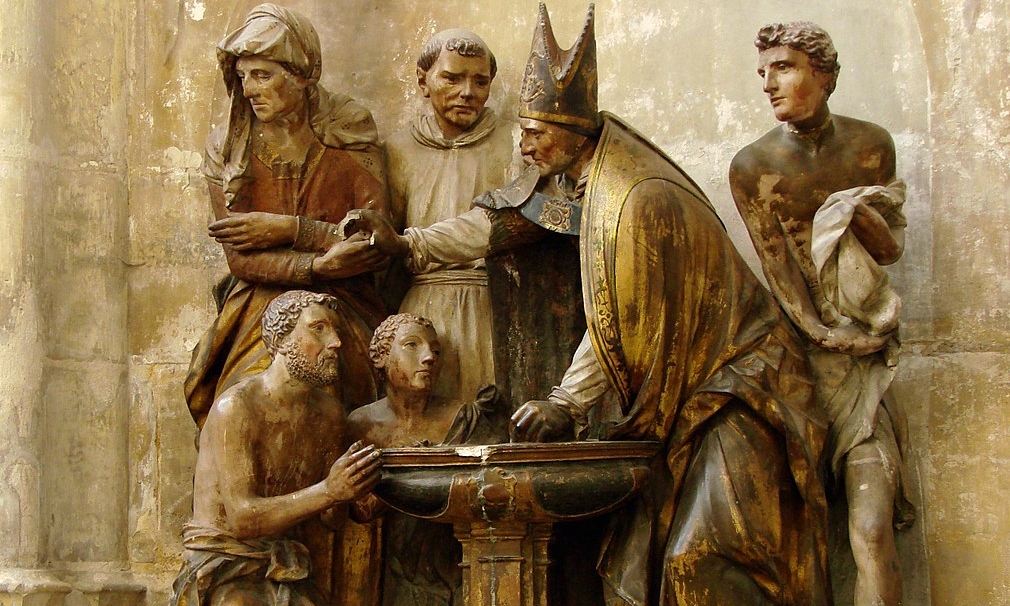Sometimes we avoid the medicine because we don’t like to admit that we are sick. We look away, make excuses, or minimize the danger. Then, with a jolt, a shock bends us double, knocks us down and out. Finally, desperately seeking healing, we look back regretfully and, seeing all the pain we could have skipped over, we kick ourselves. As with our physical health, we do this with our spiritual health when we avoid the grace of the sacraments, the medicine that heals and pacifies our souls.
Augustine’s Confessions captures this dynamic. Although they signed him up as a catechumen, his family never had Augustine baptized. Yet he well remembered, when he fell ill as a boy, “with what fervor of mind and with what faith I then begged for the baptism of your Christ.” When the fever dissipated, however, so did his desire. “My cleansing,” he recalled, “was deferred on the assumption that, if I lived, I would be sure to soil myself” (1.10).
Such an attitude was common then. Augustine often heard the gossips say, “Let him be, let him do it; he is not yet baptized.” It took Augustine time, and much pain, to realize the lack of logic. “Yet in regard to bodily health we do not say: ‘Let him inflict more wounds on himself, for he is not yet cured’” (1.11). Why let those little wounds fester, spread, and infect the whole life? Why not seek preventative care and healing remedies for any future reinjuries?
On the other end of a life, lived as if always limping from these wounds, Augustine lamented how close he had come to the one remedy that could have spared him those years of incalculable woundedness. “How much better for me if I had been quickly healed and if … action had been taken by which I received the health of my soul and was kept safe under the protection which you would have given me? Certainly much better” (1.11). Instead, he chose to ignore the wound, filling his life with little paltry pleasures, clever rhetoric, or the pseudo-spiritualism of quasi-mystical cults—any little band-aid to hide the wound and avoid the cure.
Yet, though he laughed “at the counsels of [God’s] medicine,” the Lord “did not allow [him] to die in this sad condition of both body and soul” (5.11). The story of Augustine’s conversion is one of tearing off the band-aid, of being forced to see the deep sickness of his soul. In terror and madness, desperation and weakness, he helplessly thrashed until he heard the Divine Physician direct him to the true medicine: “but put on the Lord Jesus Christ” (Rom 13:14).
Putting on Christ in baptism, he finally found his soul healed. With simplicity, he recounted: “We were baptized, and disquiet about our past life vanished from us” (9.6). The sacrament washed from all those bleeding wounds the noxious sickness that had riddled his soul and infected his life.
Augustine’s belated conversion shows us we need not fear to come to or return to the sacraments, those protections God gives us. In Augustine, we see the wholesomeness and wholeness that putting on Christ brings to the soul. Baptism regenerates our souls to full health, but we may fall sick in sin again. That is why, as St. Thomas says, “man needs something which will bring him back to health” (De Articulis Fidei). Christ instituted the sacrament of Reconciliation so that we might always have abundant access to his grace, the medicine that returns our souls to the health of baptism day. In Confession, we acknowledge our occasional colds or flu or even a recurring cancer: “Lord, be merciful to me; Heal my soul, for I have sinned against You” (Ps 41:4). And, so often as we do, we will find “pardon and peace” (Rite of Reconciliation) flooding our souls as disquiet again vanishes.
Deliver also those who do not as yet pray, that they may call upon you and you may set them free. (1.10)
✠
Image: Baptism of St. Augustine at the Troyes Cathedral







